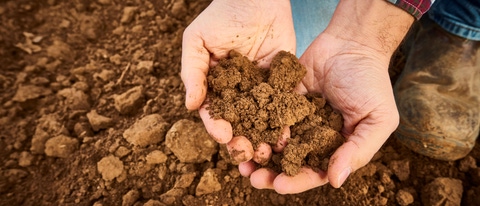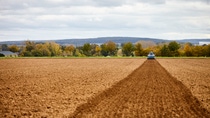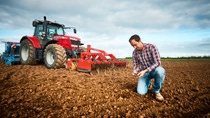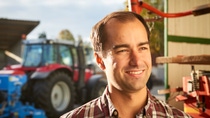Combating Climate Change
Helping farmers do the

Agriculture
With agriculture being responsible for about 17% of global greenhouse gases (source: FAO), farmers play an important role to help achieve net zero greenhouse gas emissions and limit global warming. But what exactly can they do in concrete terms? Find out what measures help reduce CO2e emissions on their farms.
Wheat field around Erftstadt, Germany
Heinrich Esser, farmer in Germany
At first glance, there is not much to say about Heinrich Esser’s wheat field. It is no different from the other fields in the region around Erftstadt, about 30 kilometers southwest of Cologne and not far from the German border with the Netherlands and Belgium. But this is deceptive. This field has great potential. It could be an additional income opportunity for farmers. It could contribute to mitigating global warming. And as if that weren’t enough, it could have the power to change the future of agriculture.
Heinrich Esser owns a farm and is the sixth generation to cultivate a fertile arable land the size of about 200 soccer fields in the Zülpicher Börde. He is always looking for new ways and innovative farming solutions to balance climate protection as well as crop quality and yields. Society’s increasing awareness of agriculture’s impact on the environment and its pressure on the food industry, also spurs his entrepreneurial spirit.
Heinrich Esser’s efforts for sustainable food production are also evident in the marketing of his products. He focuses on growing cereals, potatoes, and specialty crops such as asparagus and strawberries. To market his crops, he chooses short routes: His fruit and vegetable products find their way to his own small farm shop or are sold in various supermarkets nearby. The wheat partly goes to a mill in the region or is sold to agricultural retailers.
It is important to us that we live not only from nature, but with nature.
“My family has been involved in agriculture for centuries. It means a lot to us to cultivate the farm and our fields in a way that future generations can also make a living from it. It is important to us that we live not only from nature, but with nature,“ Esser emphasizes. Being a good steward of the land that one relies on to keep one’s business – this task is becoming increasingly difficult for farmers with the changing climate and its impact on the planet.
“As farmers, we are naturally affected by climate change. Especially, longer dry phases and heavy rainfalls with too much water for the dried-out soil are causing us problems. That is why, we select the varieties we plant accordingly and try to use water more sparingly,” the farmer explains. Additionally, he has already established various biodiversity measures to optimize the carbon footprint of his operations in recent years. These include flower strips, set-aside areas, wide rows, and other measures – for him, ecological aspects are not neglected despite the cost pressure.
Although it is not always easy to achieve a consistently high yield while causing as few emissions as possible, his work pays off: With an average carbon footprint of about 150 kg CO2e per metric ton of wheat yield on selected fields over the last three years, the farmer’s operation is already very progressive and climate friendly. In comparison, a farm in Germany growing wheat emits on average more than twice as much. Heinrich Esser is clearly at the forefront of sustainable farming today; nevertheless, he does not stop looking for opportunities to develop further. That is why the offer to be the first test farm for the project with BASF and RWZ came just at the right time.
Partnership for a new, more sustainable and climate-smart food value chain
The aim of the project “Climate Partner Agriculture” is to gain scientifically sound insights into how to reduce CO2e emissions in agriculture. This will help achieve one of BASF’s ambitious Sustainability Commitments in agriculture – cutting carbon emissions by 30% per ton of crop produced by 2030 while maintaining at least the same productivity and quality. For the first time, the project takes into account the entire production process of a farm, from sowing to harvesting and storage of agricultural products. The project is designed to run for ten years.
The results of the first season already give rise for optimism: After harvesting the first climate-optimized winter wheat on Heinrich Esser’s trial fields it can be reported that all the targets set have been exceed. The farmer, who was already producing very low CO2e emissions in his wheat production compared to the regional average, was able to harvested winter wheat on a trial plot whose CO2 footprint was even more than one third lower compared to his farm standard. Additionally, the yield on this trial plot is almost 3% higher than on the control fields and also the quality values such as protein and starch are at least as good and meet the requirements for bread quality.
We are stepping up together as ‘Climate Partner Agriculture’ to create a new, more sustainable and climate-resilient value chain.
Dr. Christoph Leufen, Head of the division Plant Production (fertilizers, seed, plant protection, timber and feed, research, development and advisory) at RWZ, points out: “We are stepping up together as ‘Climate Partner Agriculture’ to create a new, more sustainable and climate-resilient value chain. In this way, we are making an important contribution to creating a climate-optimized, practicable and economical agriculture of tomorrow.”
With the sowing of winter wheat in fall last year on Heinrich Esser’s farm, various crop management measures to reduce CO2e emissions were established on eight trial plots. Dr. Heinz-Gerd Wegkamp, Sustainability Manager at BASF Agricultural Solutions Germany, explains: ”In addition to several fertilizer and crop protection strategies, this also includes the use of bio stimulants. The results will be used to derive recommendations for the CO2e-optimized cultivation of winter wheat from the coming season.” The digital decision support tool xarvio® FIELD MANAGER recommends what, how much and when to do it, and at the same time creates the corresponding variable application maps for sowing, fertilization, and crop protection use.
Since xarvio FIELD MANAGER was linked to BASF’s certified sustainability tool AgBalance® for the first time, the recommendations are not only aimed at achieving the highest yield, but also at keeping the carbon footprint as small as possible, while supporting a more efficient use of crop application. In addition, the digital tool also determines CO2e savings based on satellite, operating and test data, among other factors. The recommendations of the xarvio FIELD MANAGER can also be fine-tuned to the field-specific conditions by a crop consultant. To ensure that the farmers’ commitment pays off economically, the partners have developed a certification process along the value chain that remunerates the CO2e savings.
Agriculture can make a significant contribution to reducing greenhouse gas emissions. But to do so, the entire food value chain must work together. “It can only be done if all pull in the same direction. If we want to contribute to solving the problems of our time and to a more sustainable future, we need to pool know-how from different fields and work together on solutions and be willing to pay the value for this. Investing in sustainability and climate protection requires commitment from all partners,” says Jutta Schock, Head of Marketing & Innovation at GoodMills Innovation, one of Europe’s leading milling companies and the region’s largest flour producer. “As a mill, refiner and marketer of climate-optimized grain, GoodMills plays an important role as a link between agriculture, producers and the market,” she adds.
Heinrich Esser is proud of his first freshly harvested, climate-optimized wheat. He is aware that he is breaking new ground and is contributing to find new paths for his business and agriculture.
Published September 6, 2023
For media inquiries or to repurpose the story, please contact:
tanja.rolletter@basf.com
julian-niclas.prade@basf.com


.jpg)
